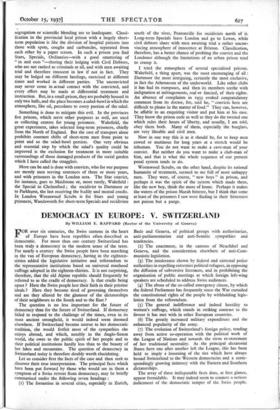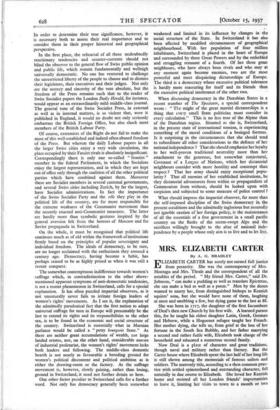DEMOCRACY IN EUROPE: V. SWITZERLAND
By WILLIAM E. RAPPARD (Rector of the University of Geneva)
FOR over six centuries, the Swiss cantons in the heart .I: of Europe have been republics often described as democratic. For more than one century Switzerland has been truly a democracy in the modern sense of the term. For nearly a century the Swiss people have been marching in the van of European democracy, having in the eighteen- sixties added the legislative initiative and referendum to the representative institutions based on universal manhood suffrage adopted in the eighteen-thirties. It is not surprising, therefore, that the old Alpine republic should frequently be referred to as the cradle of democracy. Is that cradle being upset ? Have the Swiss people lost their faith in their pristine ideals ? Have they become tired of governing themselves and are they allured by the glamour of the dictatorships of their neighbours to the South and to the East ?
The question is no less important for the future of democracy than for the future of Switzerland. If democracy failed to respond to the challenge of the times, even in its most ancient stronghold, it would indeed seem doomed elsewhere. If Switzerland became untrue to her democratic tradition, she would forfeit most of the sympathies she enjoys abroad, and which, notably in the Anglo-Saxon world, she owes to the public spirit of her people and to their political institutions hardly less than to the beauty of her lakes and mountains. The question of democracy in Switzerland today is therefore doubly worth elucidating.
Let us consider first the facts of the case and then seek to discover their true interpretation. The principal facts which have been put forward by those who would see in them a Symptom of a Swiss retreat from democracy, may be briefly summarised under the following seven headings : (I) The formation in several cities, especially in Zurich, Basle and Geneva, of political groups with authoritarian, anti-parliamentarian and anti-Semitic sympathies and tendencies.
(2) The enactment, in the cantons of Neuchatel and Geneva, and the consideration elsewhere of anti-Com- munistic legislation.
(3) The intolerance shown by federal and cantonal police authorities in expelling extremist political refugees, in opposing the diffusion of subversive literature, and in prohibiting the organisation of public meetings at which foreign left-wing speakers are scheduled to address Swiss audiences.
(4) The abuse of the so-called emergency clause, by which the federal Parliament has frequently since the War curtailed the constitutional rights of the people by withholding legis- lation from the referendum.
(5) The general indifference and indeed hostility to women's suffrage, which stands in striking contrast to the favour it has met with in other European countries.
(6) The greatly increased military expenditure and the enhanced popularity of the army.
(7) The evolution of Switzerland's foreign policy, tending away from active co-operation with the political work of the League of Nations and towards the stern re-statement of her traditional neutrality. As the principal dictatorial States have one after another left the League, this has been held to imply a loosening of the ties which have always bound Switzerland to the Western democracies and a corre- spondingly growing intimacy with the Eastern and Southern dictatorships.
The array of these indisputable facts does, at first glance, appear formidable. It may indeed seem to connote a serious indictment of the democratic temper of the Swiss people. In order to determine their true significance, however, it is necessary both to assess their real importance and to consider them in their proper historical and geographical perspective.
In the first place, the rehearsal of all these undoubtedly reactionary tendencies and counter-currents should not blind the observer to the general flow of Swiss public opinion and public life, which remain fundamentally and wellnigh universally democratic. No one has ventured to challenge the unrestricted liberty of the people to choose and to dismiss their legislators, their executives and their judges. Not only are the secrecy and sincerity of the vote absolute, but the freedom of the Press remains such that to the reader of Swiss Socialist papers the London Daily Herald, for instance, would appear as an extraordinarily mild middle-class journal. The general tone of the Swiss Socialist Press, in external as well as in internal matters, is so violent that, were it published in England, it would no doubt not only seriously embarrass the British Foreign Office, but also shock most members of the British Labour Party.
Of course, extremists of the Right do not fail to make the most of this well-established and indeed often abused freedom of the Press. But whereas the daily Labour papers in all the larger Swiss cities enjoy a very wide circulation, the place occupied by their Fascist rivals is absolutely insignificant. Correspondingly there is only one so-called " frontist " member in the federal Parliament, in which the Socialists enjoy the largest representation, and in which they are kept out of office only through the coalition of all the other political parties which have combined against them. Moreover there are Socialist members in several cantonal governments, and several Swiss cities including Zurich, by far the largest, have Socialist administrations. In fact the importance of the Swiss Socialist Party and the role they play in the political life of the country, are far more responsible for the extreme weakness of the Communist movement than the recently enacted anti-Communist measures. The latter are hardly more than symbolic gestures inspired by the general aversion felt from the horrors of Moscow and for Soviet propaganda in Switzerland.
On the whole, it must be recognised that political life continues much as of old within the framework of institutions firmly based on the principles of popular sovereignty and individual freedom. The ideals of democracy, to be sure, are no longer acclaimed with the enthusiasm they aroused a century ago. Democracy, having become a habit, has perhaps ceased to be as highly prized as when it was still a recent conquest.
The somewhat contemptuous indifference towards women's suffrage which, in contradistinction to the other above- mentioned apparent symptoms of anti-democratic tendencies, is not a recent phenomenon in Switzerland, calls for a special explanation. It has often puzzled impartial observers, as it not unnaturally never fails to irritate foreign leaders of women's rights' movements. As I see it, the explanation of the admittedly paradoxical fact that the first nation to adopt universal suffrage for men in Europe will presumably be the last to extend its rights and its responsibilities to the other sex, is to be found in the economic and social structure of the country. Switzerland is essentially what in Marxian parlance would be called a "petty bourgeois State." As there are neither great accumulations of wealth, nor large landed estates, nor, on the other hand, considerable masses of industrial proletariat, the women's rights' movement lacks both leaders and following. The middle-class domestic hearth is not nearly as favourable a breeding ground for women's political discontent and political ambition as is either the drawing-room or the factory. As the suffrage movement is, however, slowly gaining, rather than losing, ground in Switzerland, it need not further detain us here.
One other factor peculiar to Switzerland calls for a further word. Not only has democracy generally been somewhat weakened and limited in its influence by changes in the social structure of the State. In Switzerland it has also been affected by modified circumstances of geographical neighbourhood. With her population of four million inhabitants, Switzerland is placed in the heart of Europe and surrounded by three Great Powers and by the enfeebled and struggling remnant of a fourth. Of her three great neighbours, who have always been rivals and who may at any moment again become enemies, two are the most powerful and most disquieting dictatorships of Europe. The third is a democracy whose excessive political tolerance is hardly more reassuring for itself and its friends than the excessive political intolerance of the other two.
When discussing democracy in the Danubian States in a recent number of The Spectator, a special correspondent wrote : " TEe might of the great martial dictatorships is a thing that every small State politician must consider in every calculation." This is no less true of the Alpine than of the Danubian region. Situated as she is, Switzerland, - in the present state of international tension, is experiencing something of the moral conditions of a besieged fortress. Is it surprising in the circumstances that she should tend to subordinate all other considerations to the defence of her national independence ? That she should emphasise her loyalty to her well-proven traditional neutrality more than her attachment to the generous, but somewhat conjectural, Covenant of a League of Nations, which her dictatorial neighbours consider with more hostility and contempt than respect ? That her army should enjoy exceptional popu- larity? That all enemies of her established institutions, be they dictatorial adventurers from within or propagandists of Communism from without, should be looked upon with suspicion and subjected to some measure of police control ?
What should impress the impartial observer, far more than the self-imposed discipline of the Swiss democracy in the present conditions and the admittedly inglorious but assuredly not ignoble caution of her foreign policy, is the maintenance of all the essentials of a free government in a small pacific country on the flanks of the storm-swept Alps and the sacrifices willingly brought to the altar of nationil inde- pendence by a people whose only aim is to live and to let live.























































 Previous page
Previous page